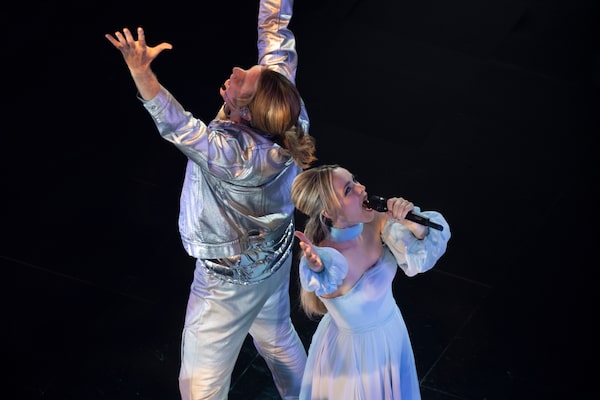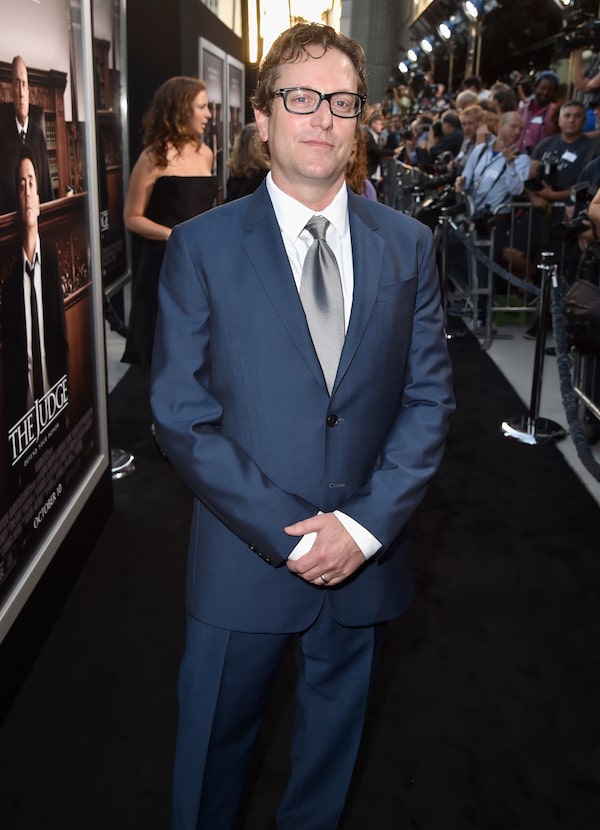
The characters played by Will Ferrell and Rachel McAdams want to be taken seriously as musicians.John Wilson/Netflix
It is an odd time to be releasing a comedy. Start with the fact that major studios have inched their way out of the big-screen comedy game over the past few years, then add the fact that the big screen is not even a thing at the moment. So director David Dobkin can count luck and accidental timing being on his side with his new Will Ferrell vehicle, Eurovision Song Contest: The Story of Fire Saga.
Ahead of the film’s Netflix premiere, Dobkin – who helped usher in a certain breed of star-led early-aught comedy with Wedding Crashers, Fred Claus, and Shanghai Knights – spoke with The Globe and Mail about the evolving nature of the genre.
One of the things that struck me about the new movie was how the characters played by Will Ferrell and Rachel McAdams desperately want to be taken seriously as musicians, but they’re constantly asked to sing a stupid little ditty called Ya Ya Ding Dong. It felt emblematic of the movie itself – it has a silly premise, but it also strives to show real characters, a real emotional arc. Or maybe I’m reading too much into it?
No, you’re not at all. I thought that the script was hilarious and the event itself is insane; I wasn’t aware of Eurovision before this project was brought to me. But I didn’t want to make a movie that was just a parody. Any good comedy should have a story to tell. As Will, [co-writer Andrew Steele] and I explored the themes of letting dreams of fame blind you to the things right in front you, we slowly realized we were making something more emotional. It’s obviously an absurdist script, but I like grounding something that broad.
Do North American audiences need to walk into this knowing that Eurovision is a very real thing?
I thought a lot about whether audiences might be confused. We wrote a prologue for the movie in case we had to explain Eurovision. But the first test screening in America, there was zero confusion. They got the campiness of it, the emotion of it, so we backed off. There is only one cut of the movie that will run globally.
How much cooperation did Eurovision itself offer?
Complete. We were shooting at their semi-finals in Tel Aviv up until 60 seconds before they ran live. They let us have the place before broadcast, when it was packed. That’s crazy. Nobody would let you on the field of the Super Bowl with your own cameras and performers 15 minutes before kick-off.

As a filmmaker, David Dobkin is sad that people can't experience movies in theatres, but appreciates platforms that bring movies to the home.Kevin Winter/Getty Images North America
This is Will’s first movie for Netflix, and yours. Do you find that the mainstream Hollywood studios, the ones that released Wedding Crashers and The Change-Up, are backing away from comedy?
I don’t know if they did it consciously or if it was something that slowly started to happen, where people were not going to comedies in theatres. But things happen in waves. No one was going to horror for a while, and now everyone is. One of the great things that happened with Netflix is that they brought stand-up comedy alive in your home in a way that [it] never was – maybe HBO did some of it, but Netflix has become a comedy leader. Now they’ve taken on all these movies that would’ve been very hard to make at a studio.
It’s been a new experience, and it’s a very weird moment. When we were doing test screenings for this, there was a part of me that was like, “Oh no!” Being in a theatre with people laughing is so much fun. We were going to have a theatrical release before we debuted on Netflix, a small window. It’s interesting: When I watched The King of Staten Island, I didn’t feel like I was lacking a connection to it because I wasn’t in a theatre. I still had a great experience. I’m sad as a filmmaker that people aren’t in theatres for a lot of stuff, but excited and grateful that there’s another platform succeeding in bringing these stories and fun to people, and it’s working on a massive scale.
There is a lot of chatter about Wedding Crashers 2 since your interview last week in which you teased its development. But have you thought much lately about the original, and about that bedroom scene between Vince Vaughn and Keir O’Donnell, which is pretty homophobic?
I think that there’s a lovely connection between Vince and Keir’s characters, it comes from a loving place. But how and why things are funny and when they’re funny in culture is an important thing for us to look at, and I think those things have to be addressed and acknowledged. If it’s something that created any pain or discomfort for people, I would never want to hurt anyone. I have lots of gay family members and friends who love the movie and have never brought it up to me. But I’m not sure what their thoughts are. Those kinds of scenes are hard to quantify.
I am a huge supporter of everybody’s rights, but I’m also a white cis man and aware of the privileges I’ve had in my life because of that. I’m really glad to see an awakening happening, and as for how that affects comedy in the long run? I’m much more for the world being a peaceful place and people feeling connected than people laughing. Let me be clear about that: justice supersedes comedy. But I don’t think that comedy needs to be completely politically correct in every way, shape or form.
I was asked once to remove a Jewish joke from one of my movies by the head of a studio, and I said no. He was shocked. But I said, “I’m Jewish, it’s the one joke that I’m allowed to make, and I want the right for other people to make the joke, too.” I’m a big believer in the [Skokie Affair] – freedom of speech is important, and comedy is freedom of speech. But I don’t want to be mean, and there’s nothing in my movies that are mean-spirited.
My publicists are going to flip out that I went that far, but I feel strongly. The comedy thing … it needs to be protected, but it is necessary to go back and look at your work and go, “Wow, I might have been wrong.” We do want to grow, don’t we? And I haven’t seen that movie in 15 years. I’ll have to go back and watch it.
Really, since its premiere?
Do you know how many times I saw that movie before it came out? Too much.
Eurovision Song Contest: The Story of Fire Saga is available to stream on Netflix starting June 26
This interview has been condensed and edited
Plan your screen time with the weekly What to Watch newsletter. Sign up today.
 Barry Hertz
Barry Hertz